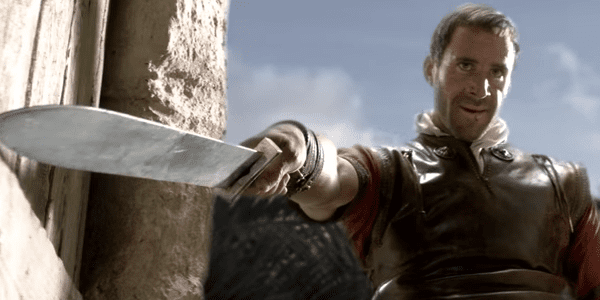
One of the biggest debates among Christians revolves around the resurrection. Did Jesus literally resurrect in bodily form? Liberal and progressive Christians generally argue that the resurrection wasn’t about Jesus’ physical body, but about the spirit of Jesus resurrecting in the hearts of his disciples. Conservative and evangelical Christians generally argue that Jesus’ body literally resurrected and his disciples saw his physical, resurrected body.
I hope I can keep my progressive creds, because I believe in the bodily resurrection of Jesus. But I think it’s important to note that we can get sidetracked by these types of theological debates. The resurrection isn’t just about what happened to Jesus’ body. It’s also about what happened to the disciples, and thus, what happens to us.
The move “Risen” explores this very practical question – “What difference does the resurrection make to our lives?”
Whether we believe in a bodily resurrection or not, the resurrection matters because it leads us into a different way of life. In other words, it leads to conversion. This conversion is not simply an intellectual assent to believing that Jesus literally rose from the dead. Risen shows that there is room for faith and doubt when it comes to the resurrection. But there is a different kind of conversion that Risen points to; it’s the conversion from violence to nonviolence. Here’s how Risen portrays this conversion:
In the beginning of the movie, Jewish zealots violently challenge the rule of Rome. In response, the narrator says that, “Rome brings them death.” Death is everywhere in Risen, but the death that comes from Roman violence had a purpose. It was meant to bring peace to the Empire. Peace is a good thing, of course. And the Jewish religious and political elite want peace, too. The High Priest Caiaphas says, “We seek what Caesar seeks – peace.”
It’s important to point out that it’s not “the Jews” who turned against Jesus and his disciples. There were many different responses to his ministry. Some, such as Joseph of Arimathea, loved him. But some others, such as Caiaphas, wanted him dead. And for Rome, a resurrected Jesus simply allowed for more death, as the Roman Governor Pilate threatened that if the resurrection were true, “I’ll kill him again.”
Pilate and Caiaphas aren’t evil people. One of them even asks an important question about all the violence and death, “All that for peace? Is there not another way?”
Unfortunately, they don’t know the other way to peace. They simply follow a pattern that we see throughout human history. Whenever we have felt that our peace and security has been threatened, we unite against a common enemy. This enemy becomes our scapegoat, the one who is blamed for all the problems that we face. This pattern of human history says that the way to peace is to kill or banish our enemies.
Risen clearly shows that Jesus offered an alternative to that pattern. It’s the alternative of nonviolence, love, and forgiveness.
The movie’s main character is Pilate’s right hand man, a Roman Tribune named Clavius. The Tribune had to do Pilate’s dirty work. Clavius was in charge of death. He fought in wars and he supervised crucifixions. Clavius was a violent instrument of death.
Clavius supervised the crucifixion of Jesus. He was there and made sure that Jesus died. When rumors of the resurrection swirled, Clavius was in charge of suppressing the rumors. But as he attempted to suppress the rumors, he came face to face with the alternative to the human pattern of death.
Clavius interrogates two followers of Jesus – Mary Magdalene and a disciple named Bartholomew. They both have a nonviolent and joyful spirit to them, but Bartholomew explicitly makes two points. First, he told Clavius about Jesus, “If he had lived, I believe Yeshua would have embraced you as a brother, even as you slew him.” Second, Bartholomew puts Clavius at ease, saying, “Our only weapon is love.”
The disciples continue to make those types of statement in the face of possible persecution. Over time, those statements lead to Clavius’s conversion from violence to nonviolence. In one scene, Clavius searches a town for the disciples. He follows Mary to a room, where the disciples are enjoying each other’s company. Clavius looks in the room and notices the resurrected Jesus smiling at him. “Welcome, Clavius,” says Jesus. “There are no enemies here.”
Throughout the rest of the movie, Clavius discovers that there is another way to peace. Instead of uniting against a common enemy for peace, Jesus shows us how to live as if “there are no enemies here.” Love for enemies, as Jesus taught in the Gospels, is the way to true peace.
Near the end of the movie, Clavius talks with Jesus as they sit on a boulder, looking deep into the vastness night sky. Clavius confesses, “When you died, I was present.” Jesus gently puts his hand on Clavius’s shoulder and says, “I know.” There’s forgiveness in those words and in that gentle touch, a forgiveness even more vast than the night sky.
“I cannot reconcile all this with the world that I know,” Clavius says to Jesus. That’s because the world that he knew was a world of violence and death. The resurrected Jesus revealed an alternative world. A world without violence leading to the death of our enemies.
“What do you seek?” Jesus asks Clavius. “A day without death,” he answered.
Risen gets the resurrection right, not by answering the debate about whether it literally happened, but by pointing us towards a world without death. “All that for peace? Is there not another way?” Risen has shown us the other way. It’s the way of nonviolent love that embraces even our enemies. It’s the hope that one day we might all be able to say, “There are no enemies here.”











